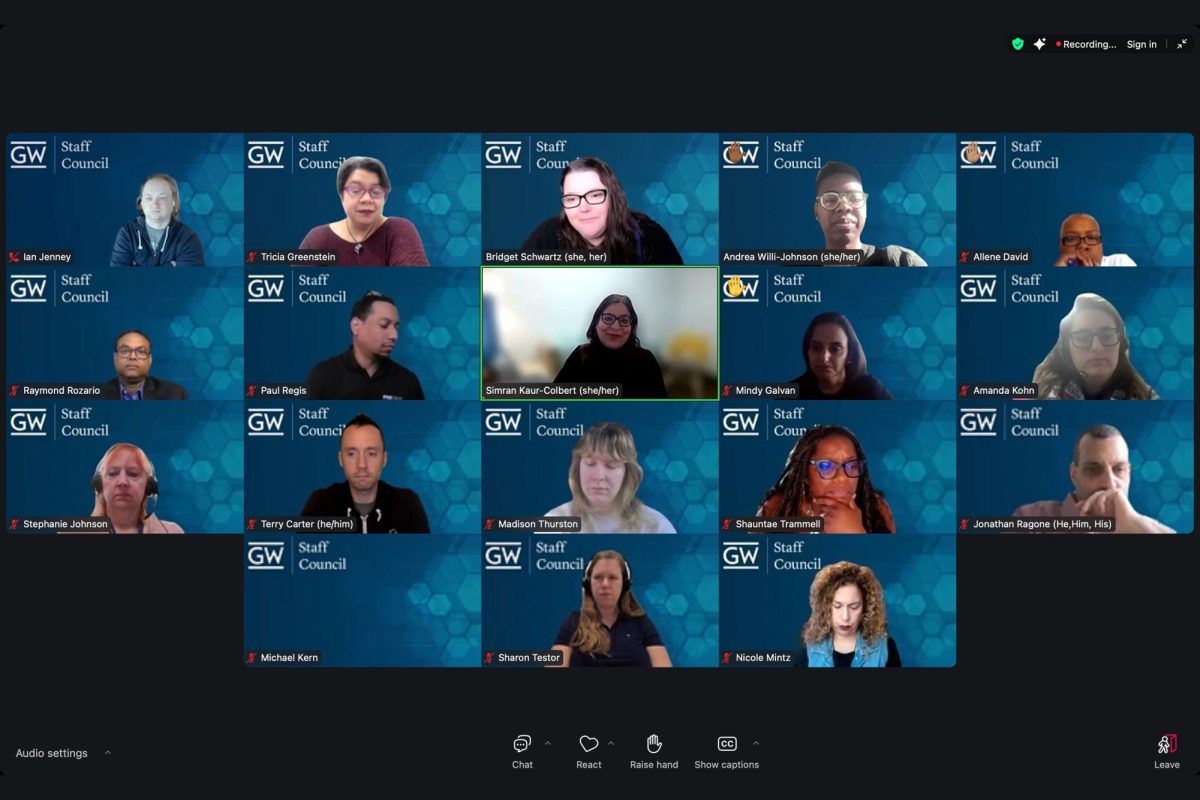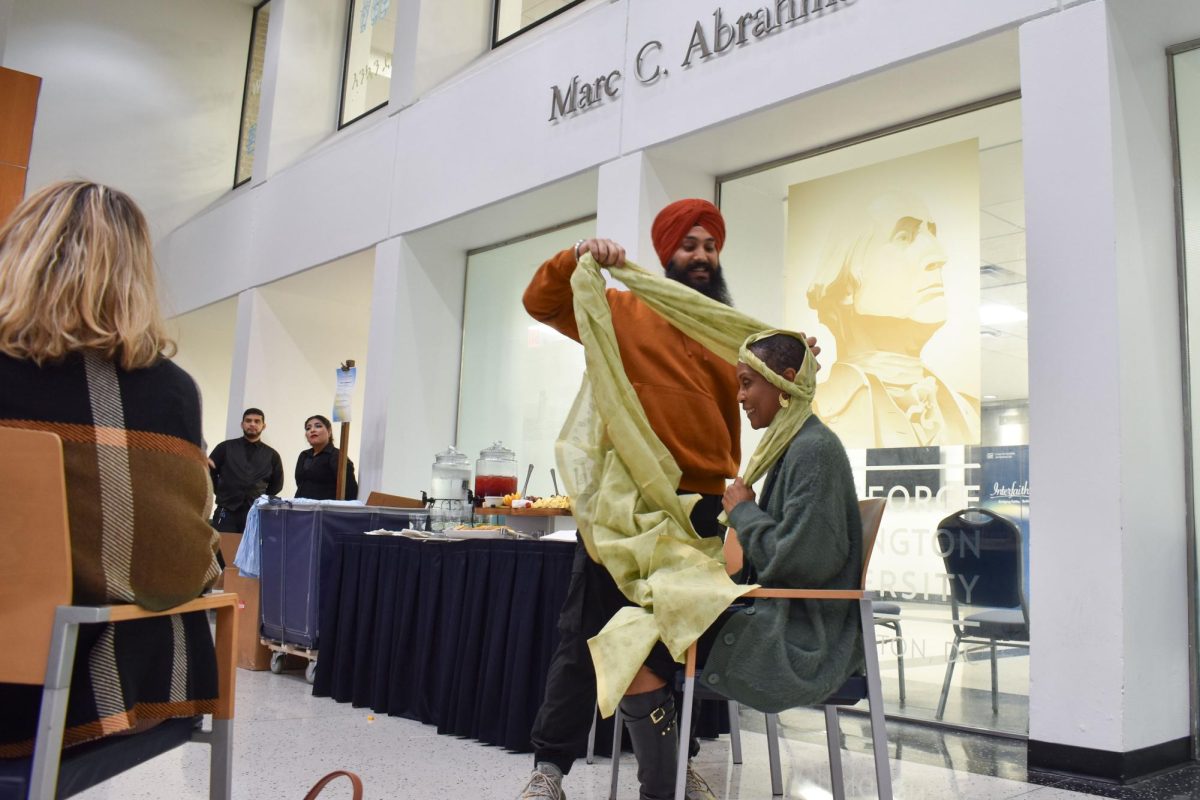Staff members said Friday that officials aren’t prioritizing staff concerns about low compensation and limited opportunities for career advancement as they work to develop GW’s next strategic plan.
Officials in September announced the University’s strategic framework — which will guide officials in shaping their new strategic plan — and outlined the four pillars GW will focus on when building the plan, including advancing interdisciplinary research, bolstering students’ global perspectives, teaching skills for global excellence and prioritizing professional and skill development. Nicole Mintz, the chair of the Staff Council Staff Experience Committee, said at a meeting Friday that the committee reviewed the framework and concluded that officials didn’t recognize or incorporate staff perspectives into its outline.
Mintz said the lack of recognition is evident in the section of the plan that outlines skills development, which she said focuses solely on students and faculty. The section states that students choose GW for its “world-class faculty” and that the pillar hopes to explore how the University can teach students skills, like critical thinking, data literacy and problem-solving.
She said staff’s concerns about compensation, their career paths and a lack of inclusion in University initiatives aren’t being included the way officials are including student and faculty concerns.
Staff reported in a survey last month that they receive low salaries and limited opportunities for professional growth at the University. In August, staff reported “overwhelming” burnout, heavy workloads and inadequate job training in a similar survey.
“Our voice is not being recognized in a formidable way as others on this campus and University,” Mintz said.
Mintz said she believes these issues can be resolved and said she is “very hopeful” that officials can incorporate staff perspectives in the plan because it wouldn’t require officials to largely adjust the framework. She said staff members are in the process of drafting a letter about these concerns, which they could ultimately deliver in the form of a letter or another type of proposal.
“I think it’s something that can be resolved,” Mintz said. “So I don’t see this, I’m hoping, as a big mountain that needs to be moved.”
Officials announced in February that they’d host a series of virtual discussions with students, faculty and staff about GW’s future to develop a new strategic plan. During the discussions, staff said the University should expand remote learning opportunities and increase financial aid and benefits packages for students.
The University has lacked a strategic plan since 2020 when officials deemed former University President Thomas LeBlanc’s plan “obsolete” after the COVID-19 pandemic led to a decline in enrollment and after the plan’s critics said it lacked community input. LeBlanc’s plan included a 20/30 initiative to cut undergraduate enrollment by 20 percent, while increasing the University’s number of STEM majors to 30 percent. Faculty members said the plan violated principles of shared governance and could lead to major cuts in funding to humanities departments.
LeBlanc’s plan did not directly include a specific framework for staff, but it included staff in the plan’s High-Impact Research pillar, which included a goal to identify, support and retain leadership, faculty, students and staff.
During Friday’s meeting, Staff Council members also heard from Simran Kaur-Colbert, the inaugural director of the University’s Center for Interfaith and Spiritual Life, who said the University will host an Interfaith Week from Nov. 10 to 15, including an open house for the center, which is located in the lower level of the University Student Center.
She also said there will be a “whole lot” of programming throughout the week to allow the GW community to meet with interfaith leaders across religious, spiritual and secular backgrounds on and off campus.
“I’m excited for that week, because it’ll give me the chance to connect with our students, faculty, staff and community members across those different identities as well,” Kaur-Colbert said.
Kaur-Colbert invited staff to the week’s “faith zone training,” which New York University initially developed to help grow religious literacy on college campuses and help people from different religious and spiritual upbringings support one another.
“It’s not to teach people necessarily what a religion believes or to preach a particular religion but to equip folks who attend to develop an understanding of how religion plays a role in people’s lives weather that’s around diet, holidays, Holy Days, accommodation,” Kaur-Colbert said.
November’s interfaith week will be the second interfaith week of 2024 after officials held a week of programming in April to explore and celebrate spiritual and religious groups on campus through tabling events and dinner discussions hosted by the Office of Diversity, Equity and Community Engagement, GW Catholics and GW Hillel. Students in April said they noticed a lack of representation of religions other than Catholicism and Judaism — particularly an absence of Islamic events — in the week’s overall programming.
Officials originally scheduled the spring interfaith week for Jan. 29 through Feb. 5, which was slated to be hosted by the Multicultural Students Service Center.
Staff Council President Bridget Schwartz said Michelle Fargher, the chair of the Staff Development and Recognition Committee, stepped down due to professional and personal reasons. Schwartz suspended the committee until the end of the current term, which is set to end Dec. 31.
Staff Council members did not receive updates from the Justice, Equity, Diversity & Inclusion Committee and from the Service Committee due to absences from the chairs.
Hannah Marr contributed reporting.





